Dickson, Brautigam, Aurora Orchestra, Collon, Kings Place review - disappointing Mozart concerto
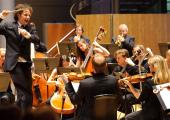


How often do two contemporary women composers get to take a stage bow during a solo recital of no more than modest length? Last night at Kings Place, within an eclectic bill of fare dubbed “Soul of a Woman” as part of the venue’s Venus Unwrapped season, Joanna MacGregor performed a brace of piano pieces by members of the audience: the Jamaican composer Eleanor Alberga and, as her unscheduled encore, Freya Waley-Cohen’s “Southern Leaves”. In the latter, the prolific and versatile Waley-Cohen channels the spirit and the struggle of Nina Simone with a lyricism striated by sorrow.


Julia Wolfe, Caroline Shaw, Anna Þorvaldsdóttir: three names on quite a list I reeled off earlier this week when someone asked me why the compositions of Rebecca Saunders, in the news for winning the €250,000 Ernst von Siemens Music Prize, make me lose the will to live, and whom I’d choose instead.
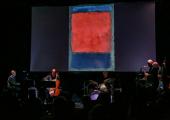
One part of the brain, they tell us, responds to visual art and another, quite different, to music; we can't cope adequately with both at once. Which is why I'm often wary of those musical organisations which think that what we hear needs to be livened up with more to see: mixing Debussy with so-called "Impressionists", for instance, or Stravinsky with Cubism. A case can all the same be made for paintings which inspire composers, and vice versa, even if it's still a stretch to handle both simultaneously.

Not really a song recital, nor a chamber music programme, this musical grab bag definitely was definitely popular. The programme of predominantly recent music was sold out weeks ahead. The notably younger-than-usual audience received it enthusiastically, and rightly so.
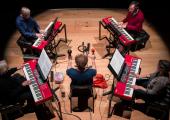
Kings Place takes a broad and "curated" approach to season programming, and events often have to fit into very nebulous and abstract themes. This concert by the London Sinfonietta was part of a strand called "Time Unwrapped" and sought to explore the role of time in music.
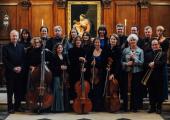
You can always depend on Handel to turn verbal dross into musical gold. The chasm between lumbering doggerel and soaring sound can seldom have yawned wider, though, that in several numbers from the third, English version of The Triumph of Time and Truth. “Melancholy is a folly, Wave all sorrow until tomorrow,” poor Mhairi Lawson had to sing, like some game trouper in a village panto scripted by the vicar after one too many cream sherries.
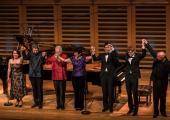
You get a lot of notes for your money in a two-piano recital - especially when seven pianists share the honours for two and a half hours' worth of playing time. Well, they did call it a marathon, crowning the London Piano Festival so shiningly planned by Katya Apekisheva and Charles Owen, and the baton passed seamlessly from two pairs of hands to the next.
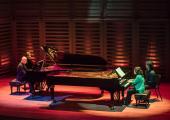
We could probably spend all day pondering what makes a great musical partnership. Is it long experience, special sensitivity, a shared sense of humour? We’d get nowhere, though because there is, genuinely, something about it that can't be explained. It’s like a good marriage: it just works, and if you could analyse precisely why, there’d likely be something wrong.